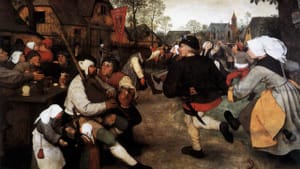Stay in the Loop
BSR publishes on a weekly schedule, with an email newsletter every Wednesday and Thursday morning. There’s no paywall, and subscribing is always free.
Death and war and a Czech barn dance
The Johannes Quartet at the Philadelphia Chamber Music Society

The Johannes Quartet spent the first half of their Philadelphia Chamber Music Society program delving into two pieces that have powerful, harrowing links to their composer’s lives.
Mendelssohn wrote his 1847 String Quartet in F Minor just after the death of his sister and just before his own death. Bartók composed his sixth string quartet in 1939, just after the beginning of World War II, at a time when he had to cope with the illness and death of his mother, in addition to the onslaught of war and the rise of fascism in his native Hungary.
When I first started listening to the Johannes Quartet’s first violin many years ago, I was struck by the way Soovin Kim varied his style and approach as he moved between composers and historical eras. The Johannes Quartet displays that same interpretative virtuosity.
The first movement of the Mendelssohn sounded like a speech by a great actor as it expressed all the conflicting emotions of a human soul faced with an irremediable catastrophe. The quartet maintained the emotional intensity as they moved into the halfhearted resolution of the second movement, the poignancy of the third, and a finale that offered none of the relief we moderns call closure.
A mesto mix
The Bartók quartet has an unusual structure. The first three movements begin with a theme Bartók labeled Mesto, which means “sadly” or “mournfully.” The mesto theme is played by the viola in the first movement, and other instruments take it up in the later movements. In the fourth movement, it becomes the main subject. The Johannes once again produced a reading that captured all the emotional range of a script that includes satirical marches and a sardonic burlesque along with the sadness.
The third item on the program, Dvořák's String Quintet in G Minor, offered some relief after the seriousness of the first half. Dvořák’s score isn’t burdened with any serious emotional freight. When you hear a big surge in the first movement, you can just enjoy it for its own sake. The second movement is a rustic dance, with the kind of foot-stomping, heavily accented beat that always sounds more attractive when it’s played on strings.
String quartets frequently vary their programs by inviting a guest. The members of the Johannes Quartet all have strong connections to Philadelphia, and they seem to favor Philadelphia musicians when they make their PCMS appearances. For their Chamber Society program last season, they partnered with Roberto Díaz, the current president of the Curtis Institute and the former principal viola of the Philadelphia Orchestra. For the Dvořák, the fifth musician was another pillar of the Philadelphia music scene, the orchestra’s principal bass, Harold Robinson.
Robinson can produce fascinating solos on his instrument, but in this case he blended with the group and added body, as he and his colleagues do with the orchestra. In the orchestra, the bass players stand on the side, and it’s easy to take their contributions for granted. The standard staging arrangement for a quintet placed Robinson in the center of the stage, facing the audience, and you could observe the intense concentration he applies to every note.
What, When, Where
Philadelphia Chamber Music Society, Johannes Quartet with Harold Robinson: Mendelssohn, String Quartet in F Minor. Bartók, String Quartet No. 6. Dvořák, String Quintet in G Major. Johannes Quartet: Soovin Kim and Jessica Lee, violins; Choong-Jin Chang, viola; Peter Stumpf, cello. Harold Robinson, double bass.
November 20, 2014 at the Perelman Theater, Kimmel Center for the Performing Arts, Broad and Spruce Streets, Philadelphia. https://www.pcmsconcerts.org/
Sign up for our newsletter
All of the week's new articles, all in one place. Sign up for the free weekly BSR newsletters, and don't miss a conversation.

 Tom Purdom
Tom Purdom